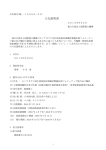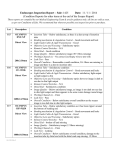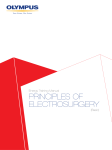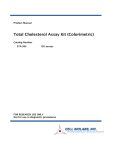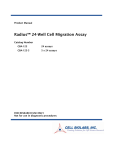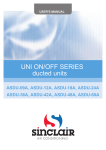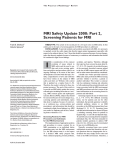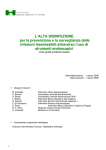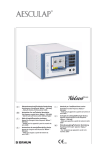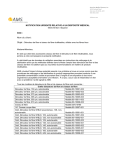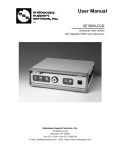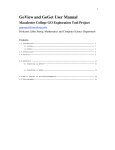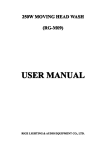Download electrosurgery handout
Transcript
9/15/2015 ELECTROSURGERY IN GI The Nursing Fundamentals MARCIA L. MORRIS, MS Disclosure: Ms. Morris is the CEO of Genii, Inc. which manufactures and sells electrosurgery generators to the flexible endoscopy market. Any photo or reference to any brand or model of electrosurgery generator appearing in this presentation is solely provided for the purpose of example and in no way indicates an endorsement. MARCIA L. MORRIS: BIO Ms. Morris is widely considered the leading US expert on electrosurgery technology as clinically applied to flexible endoscopy. She holds two issued and several pending electrosurgical patents and has served as editor for the electrosurgery section of the 4th Edition of the SGNA Manual of GI Procedures (2000) and the SGNA Manual of Pulmonary Procedures for Endoscopy Nurses (2001). She is the author of multiple peer reviewed publications and two book chapters. Ms. Morris has worked with electrosurgery as applied to flexible endoscopy since 1986. She began her GI career by helping with the introduction of the original BiCap® bipolar endoscopic probe and generators. She has led design and development teams for multiple endoscopic products, most recently the Genii gi4000 compact electrosurgery generator and the TouchSoft Coagulator® endoscopic probe. She is the founder and current CEO of Genii, Inc. From 1987 to 2007 she was the CEO of Medical Service Associates. MSA held various contracts with Cooper Surgical/Meditron, Hobbs Medical, Erbe USA and others. She has an undergraduate degree from Macalester College and a Master's Degree from the University of Minnesota. Ms. Morris often lectures on the principles and safety of electrosurgery as it relates to gastroenterology and pulmonology and has been a frequent faculty speaker at regional and national educational conferences. 1 9/15/2015 THIS PRESENTATION INCLUDES INFORMATION FROM Electrosurgery in the GI Suite: Knowledge is Power. In Press. Geri Nelson, RN, Marcia L. Morris, MS. GJN 2015 38(6) Nov/Dec Electrosurgery in the Gastroenterology Suite: Principles, Practice, and Safety. Morris, M L. 2006 Gastroenterology Nursing 29(2), 126-134 Electrosurgery in Gastrointestinal Endoscopy: Principles to Practice. Morris Marcia L, Tucker Robert D, Baron Todd H, Wong Kee Song, Louis M.. Am J Gastroenterol 2009; 104(6); 1563-74. Please also note the list of Selected References and Suggested Readings on the final slide. LEARNING OBJECTIVES Identify the basic technology of electrosurgery (ES) How does it work? How do we commonly use it in GI? How can we use it more efficiently? How can we use it more safely? IDENTIFY THE BASIC TECHNOLOGY OF ELECTROSURGERY: HOW DOES IT WORK? Learning Objective One 2 9/15/2015 IT’S HIGH FREQUENCY ALTERNATING CURRENT The generator (ESG) takes the current from the wall that is alternating (changing direction) 60 times a second and speeds it up. ES alternates over 300,000 times per second This bypasses most neuromuscular effects and leaves heat. INTENSE ES ENERGY HEATS THE TISSUE AND WILL CAUSE THE INTRACELLULAR WATER TO RAPIDLY TURN TO STEAM. THE CELL WALL EXPLODES. H2O H2O H2O Cell MSA© 3 9/15/2015 H2O H2O Cell Electrosurgical Cutting THIS IS MSA © ELECTROSURGICAL CUTTING ALONG A PATH CREATED BY THE ACCESSORY. WITH LESS INTENSITY, OR FOR CELLS LOCATED ALONG THE MARGIN OF THE TARGET AREA, THE INTRACELLULAR WATER IS HEATED MORE SLOWLY. 4 9/15/2015 MSA © H2O H2O H2O Cell MSA © Coagulated THE ‘TISSUE EFFECT’ RESULTS FROM THE MIX OF CELLS THAT ARE ‘CUT’ AND THOSE THAT ARE ‘COAGULATED’ The current density is the key Spreading the energy over a larger area reduces the current density (intensity) Being farther away from the energy source lowers the current density (intensity) Delivering the energy with pauses between, rather than all at once, tends to lower the current density (intensity) Delivering less total energy lowers the current density (intensity) 5 9/15/2015 THESE IMPACT THE CURRENT DENSITY: The operator’s technique and time energy is applied The character of the tissue (watery or scarred) Resistance in the entire circuit which is patient variable The chosen accessory The generator output: waveform type, starting power and the power curve. Sound like a lot to learn? Here’s an analogy that can really help! MSA© ELECTROSURGERY IS THE CORRECT TERM ElectroCAUTERY Heats the TOOL, then the tissue Can never ‘cut’ Can only coagulate Example: The Olympus Heat Probe ElectroSURGERY Heats the TISSUE not the tool Can cut and coagulate Can cut and coagulate at the same time Always needs an electrosurgery generator to produce the high frequency outputs. 6 9/15/2015 HOW GI? DO WE COMMONLY USE ES IN Learning Objective Two MATCHED WITH APPROPRIATE ACCESSORIES, ES IS USED FOR With these Accessories: Snares Sphinctertomes Contact coagulators Hot biopsy forceps Needle and ESD knives Argon coagulation probes General hemostasis of varied bleeding lesions Ablating unwanted diseased tissue Physicians often choose a little cut with reliable coagulation for polypectomy Electrosurgery has the unique ability to cut and coagulate at the same time. 7 9/15/2015 MSA copyright Physicians often choose outputs with a lot of cut and little coagulation for sphincterotomy. (Elta1998) ELECTRIC ES ENERGY REQUIRES A COMPLETE CIRCUIT IN ORDER TO FLOW BOTH MONOPOLAR AND BIPOLAR ACCESSORIES ARE UTILIZED IN ENDOSCOPY AND THE TERMS REFER TO THE MANNER IN WHICH THE CIRCUIT IS COMPLETED BY THE ACCESSORY Bipolar Accessories complete the circuit by having both the positive and the return electrode built into the accessory. 8 9/15/2015 Valley Lab Postier Mayo with permission Monopolar accessories require a dispersive electrode– (grounding pad)– to complete the circuit WHY ARE THE PADS “DISPERSIVE”? Current that will boil water if concentrated onto one square millimeter of area will not even feel warm if spread over one square centimeter. (Tucker 2000) The pad’s function is to evenly spread out the energy used for therapy, so it can harmlessly exit the body on its way back to the generator to complete the circuit. WHY ARE THE PADS “DISPERSIVE”? The monopolar current path is the invisible ‘road’ within the patient leading from the tissue therapy site to the grounding pad. Think of the path: if the patient has a right hip implant—place pad on left flank or thigh for example. We will return to this idea again when we talk about safety! 9 9/15/2015 Endoscopy Pad Placement #1 . #2 • Place close to procedure site • Choose well vascularized area • Avoid implants, bony areas, broken skin, scars, tattoos • Clean or shave skin if needed • Make sure pad is fresh and smoothly attached • Check the pad if the patient has been moved HammerbeckMSA© PAD SENSING SAFETY SYSTEMS RELY ON “SMART” (DUAL/SPLIT) PADS Dual/REM/Split Pads (Smart) Single/Mono Pads DUAL ‘SMART’ PADS When used with pad safety equipped generators: Will have a ‘Red’ warning light if NO pad is plugged in or If the pad is not registering an acceptable condition at the patient/pad site or If at any time during the procedure, the pad no longer registers a safe condition at the pad/patient site. The risk of a pad burn in GI applications is VERY low, but this excellent safety technology is low cost and recommended by safety experts. 10 9/15/2015 CAUTION: Many generators will give you the “GREEN” light even if a MONO pad is not on the patient! You need to use special care with monopolar pads. If the light is green, but no pad is on the patient, no power will be delivered. You may inadvertently perform a ‘cold’ polypectomy for example. RED LIGHT—GREEN LIGHT: TIPS! Is the light slow to go green? The pads need time to establish a baseline impedance reading for that patient, and send the ‘OK’ signal to the generator Try ‘rubbing and waiting’ before starting over with a new pad Is the pad gel fresh? (Don’t open until ready to use) Is there too much hair, lotion, or an obstruction under the pad? Is patient’s skin very dry? Moisture in the pad gel may need more time to adhere and signal Are you storing your pads in too cool an area? If this happens too often, you may try a better match between your generator and pad brand. LET’S STOP AND REVIEW Electrosurgery generators produce energy that heats tissue We can use this heat to ‘cut’ (remove) tissue or coagulate tissue to stop or prevent bleeding It’s electric so it has to complete a circuit We use dispersive (grounding) pads to complete a circuit with monopolar accessories Ready? Next Learning Objective coming up! 11 9/15/2015 HOW CAN I USE ES MORE EFFICIENTLY? Learning Objective Three GET TO KNOW YOUR OWN GENERATORS Waveform names are not standardized Suggested watt settings may vary between units and brands All current brands use microprocessors to read and adjust to changes in impedance— Each output will have its own “power curve” or ‘dosing of power’ The displayed watt setting may or may not be what is delivered over the entire activation. THE GENERATOR WAVEFORM OUTPUT NAME Soft Coag® TouchSoft® Coag Forced Coag Blend One Pulse Cut EndoCut I or Q® Blend Coag Blend Cut Swift Coag Pulse Blend Cut Fulgurate 12 9/15/2015 The names are just trying to tell you how much cut and/or coag to expect. You just need to know which one ON YOUR GENERATOR is recommended for particular procedures and/or accessories. Being able to select the waveform allows the ability to select appropriate outputs for the clinical need Crest Factor 1.4 …………………..>increasing CF MOST GENERATORS WILL EITHER ‘COME WITH,’ OR LET YOU SAVE, DEFAULT SETTINGS They are there to help make your life easier, but Your team should understand what the defaults are and why they have been chosen Some units have a MENU with names—but there is a default associated with the name. You should always chart the default—not the menu name. Some outputs are much the same, but have different names! COAG 13 9/15/2015 The names given to the outputs are not standardized Fulgurate Low Electrosurgery in Gastrointestinal Endoscopy: Principles to Practice. 2009 Am J Gastroenterol ; 104(6); 1563-74 ASGE Technology Status Evaluation Report: Electrosurgical Generators. August 2013. Gastrointest Endosc;78(2):197-208 Monopolar Output Mode Characteristics for Selected Electrosurgical Generators* Duty Cycle 100% Cres t Factor 1.4 BSC EndoStat Cut BSC Conmed EndoStat Beamer III Mate Cut, Control Cut Pure Cut, Pulse Cut Blend Blend 1 Conmed Erbe Erbe Genii Meditron/ Pentax Olympus BiCapIII ICC200 VIO300 gi4000 3000B ESG100 Force 2 Cut Cut 1,2,3,Pulse Slow, Fast Soft Coag Cut Autocut, EndoCut, SoftCoag Autocut, Cut, EndoCut, Puls eCut, SoftCoag TouchSoft Valleylab Valleylab Low Cut Pure Cut 1.5 70% 1.7 50% 2 50% 2.5 Force FX Blend Cut Pulse Blend Cut Blend Blend 1 Blend 1 Blend 37% Blend 2 2.1 Blend 2 Blend DURING THE ACTIVATION OF THE ENERGY As the tissue becomes coagulated or cut, it becomes more resistant to letting the energy flow through the tissue. Microprocessors in the generator track these changes. (They are also monitoring the grounding pad and any change in impedance there!) The generator then adjusts current and voltage as needed to produce the power directed by the software design. The design can be ‘mapped’ on a graph called a ‘power curve’. Your generator’s power curves are in the user manual! 14 9/15/2015 TWO BASIC POWER CURVES Narrow Broad TouchSoft Mode Power vs Load Resistance COAG Mode Power vs Load Resistance 140 140 120 120 100 100 Soft COAG 60 60 Soft COAG Default 50 Output Power Output Power COAG 120 Soft COAG 120 80 80 COAG 60 60 COAG Def ault 20 40 40 20 20 0 0 0 100 200 300 400 500 600 700 800 0 900 1000 1100 1200 1300 1400 1500 1600 1700 1800 1900 2000 100 200 300 400 500 600 700 800 900 1000 1100 1200 1300 1400 1500 1600 1700 1800 1900 2000 Load Resistance Load Resistance Resistance going up TWO BASIC POWER CURVES Narrow Power ramps up quickly into ‘raw’ tissue Falls automatically as tissue gets ‘white’ Bipolar is our best known example! TouchSoft® or Soft Coag® work like this too. Great For: Contact coagulation Bipolar probes TouchSoft Coagulator® Coagrasper™ The power setting you see is only the power it starts with! By the time you see white only a watt or two is being delivered! TWO BASIC POWER CURVES Broad Great For: ‘Cruise control’ keeps the power controlled around a target setting or effect Avoids things like ‘snare entrapment’ because it keeps things going smoothly Snare polypectomy Sphincterotomy Can add a ‘pulse’ feature too! (EndoCut® or Pulse Cut) Nice smooth cuts are a goal Depending on the generator the power setting you see may or may not be close to the power that is delivered. 15 9/15/2015 A REMINDER: Power settings and waveform choice are the physician’s responsibility. Always verbally confirm the requested settings before proceeding. Depending upon the ‘power curve’ the power setting displayed may not indicate the actual power that was delivered Document the settings used at the end of the case. Know your generator. They all are based on the same fundamental technology, but they can have different features and settings. A REMINDER: What you choose on the generator is only ONE of the things that affects the outcome. Technique is important! Close the snare in a controlled manner and work closely with your physician. Choose the right accessory for the job! Not all patients are the same! Be able to adjust power, or grounding pad placement. WHAT ABOUT ARGON COAGULATION? It also uses ES energy The generator provides the energy needed to ionize the gas– turn it into the gas plasma beam that you can see. It is a monopolar application. You use a dispersive (grounding) pad. Placing the pad as close to the treatment site as possible will help to get a longer ‘beam’. 16 9/15/2015 ARGON COAGULATION Has been used in GI in the US since 1997 Called APC, ABC® or ArC (argon plasma coagulation, argon beam coagulation, or argon coagulation) Provides non contact application of thermal effect The eschar produced is more pliable and can be less likely to re-bleed than other methods It coagulates or ablates Effect tends to be superficial, but the depth of the effect is controlled by Adjusting Time and/or Power The nature of the beam: amplified or non amplified Not all systems use the same settings! Know your generator! ArC Smart™ Probe; gi4000; colon WHY ARGON? A noble gas that doesn’t react with tissue, other gases—or anything else Benign, non flammable Low medical risks (suffocation only if all oxygen is displaced Heavier than air; sinks to the floor Cheap, easy to get, easy to store Forms a stable plasma at voltage outputs suitable for medical and endoscopic use. Photo courtesy of Genii ARGON COAGULATION Is safe and effective for a wide range of applications especially for diffuse lesions It really can go around corners! It always follows the circuit to the nearest tissue It really can cut off stents It will ignite under water The manufacturer’s suggested power settings VARY with the system. Your team should know the settings for YOUR brand and model. Can be used in the lung Drawing courtesy of Erbe 17 9/15/2015 LET’S STOP AND REVIEW Electrosurgery generators use the same technology, but have different features and suggested settings. Know YOUR unit to use it effectively and efficiently. Peer reviewed charts are available to help you find comparable outputs on other brands and models when needed. Microprocessors make grounding pad and other safety alarms possible. Microprocessors can adjust power, voltage and/or current in response to changes taking place in the tissue, which helps make outcomes more predictable. With a ‘narrow’ microprocessor controlled power curve, power will drop off quickly (self limiting—like bipolar) ‘Broad’ curves keep the energy flowing smoothly throughout the resistance changes. Each OUTPUT has its own power curve. It doesn’t mean the entire generator is one way or the other. In both cases, the ‘watts’ number you see on the screen might only be a start point or a maximum. It’s Ok! HOW CAN I USE ES MORE SAFELY? Learning Objectives Four SPECIAL PATIENT CONSIDERATIONS Don’t perform ES procedures if patient movement is uncontrolled Try not to activate if you can’t see It is extremely important not to use any ES (including argon coagulation) with an improper bowel prep. Catastrophic bowel explosions are uncommon, but a real risk Rare combinations of methane, hydrogen and oxygen can occur in some patients. A complete, full length colon prep should be ordered even if the ES is to performed only in the sigmoid or rectum. Always monitor patients for distension when using argon coagulation, especially on long cases. 18 9/15/2015 SPECIAL PATIENT CONSIDERATIONS Implanted Cardiac Devices- Pacemakers and cardioverter defibrillators (ICDs) are designed to sense and react to electric signals from the heart This makes them sensitive to electric signals from external sources like ESUs Device manufacturers constantly make newer models more and more robust (some can now withstand MRI) Patients with these devices can usually safely receive electrosurgery treatment, but precautions should be noted. CAUTIONS FOR CARDIAC DEVICE PATIENTS Have a protocol in place to identify these patients, the type of device and to discern if the patient is one of about 20% who are dependent on the device for moment to moment maintenance of proper cardiac rhythm. Help writing your protocol can come from consensus statements by American College of Cardiology Foundation/American Heart Association (ACCF/AHA) American Society of Anesthesiologists (HRS/ASA) American Society of Gastrointestinal Endoscopy (ASGE) An up to date summary will appear in the Gastrointestinal Nursing Journal Nov/Dec issue USE INFORMATION FROM YOUR PRE-ASSESSMENT PROTOCOL TO DETERMINE THE CHARACTERISTICS OF THE DEVICE AND THE PATIENT’S DEPENDENCE ON THE DEVICE Will the ICD need to be placed into an asynchronous (pacing but not sensing) mode during the procedure? With the exception of some dual function pacemaker/ICD devices, the placement of a ring magnet directly over the device site forces a continuous paced beat. This should be used only briefly for the few minutes during which electrosurgery is being delivered. Note: In January, 2014 St. Jude Medical announced a new finding that some of their oldest pacemakers, when exposed to ES, may exhibit a change in function that can persist for 30 seconds or longer after the ES has stopped. Placing a magnet over the device will not prevent a temporary reduction in pacing output. 19 9/15/2015 ST. JUDE (CONT) Devices of concern are the Afinity, Entity, Integrity, Identity, Sustain, Frontier, Victory and Zephyr models. Special caution or the avoidance of ES in patients with these older models is advised. Please note that NEWER St. Jude models: Accent and Anthem, and all ICDs are NOT subject to higher concern. St. Jude 2014 For questions, clinicians may call St. Jude technical service at 800-722-3774. SOCIETIES GENERALLY AGREE: For patients that are not device dependent, and with newer implants, reprogramming is usually NOT necessary. During the procedure, continually monitor cardiac function and have appropriate resuscitation equipment available When possible, choose bipolar accessories With monopolar accessories, make sure the active electrode (like the snare) is at least six inches away from the implanted device. SOCIETIES AGREE (CONT) Apply the grounding pad as close as possible to the treatment site and placed to draw current away from the device. (remember the current path?) Activate the generator in short bursts to minimize constant interruption of pacing. Use the lowest power and lowest voltage settings available that will be clinically effective. If equivalent methods are suitable, use contact modes rather than argon coagulation. 20 9/15/2015 POST PROCEDURE If the device was reprogrammed, restore it to baseline function. Confirm correct functioning of the device. No need for further follow up if the device was interrogated successfully after the procedure. MANY, MANY YEARS AGO, GENERATORS WERE ‘LEAKY’ AND ‘GROUND REFERENCED’. NOW UNITS MEET STRICT STANDARDS. AT CURRENT STANDARDS, MILI-AMP STRAY CURRENT CAN CAUSE ANNOYING VIDEO INTERFERENCE BUT NOT PATIENT OR USER HARM. MOST SAFETY CONCERNS AND ACCIDENTS CAN BE MITIGATED WITH A GOOD UNDERSTANDING OF THE MONOPOLAR CIRCUIT AND CURRENT PATH. THINK OF CURRENT FLOW IN THE CIRCUIT: And don’t connect or disconnect an accessory when current is flowing (pedal is down) Don’t wrap active cords, grounding pad cords and/or patient monitoring cords all together Replace active cords routinely. Every six months to a year is a good idea. Current cleaning methods tend to stretch the outer covering. The non elastic inner wires become detached from the inner connectors and no power will reach the accessory. Avoid as much as possible adapters and connectors. If you have them, make sure they fit well and are in good repair. Watch for worn spots or breaks in insulated coverings. 21 9/15/2015 ES WITH JEWELRY It is always a good idea for patients to remove valuables before coming for ANY medical procedure Loss, theft, tearing of pierced sites, and swelling are all risk factors But the risk from ES has often been exaggerated! “Although there may be other reasons for removal of all patient jewelry (eg, risk of swelling, theft) the risk of an alternative site injury from stray current is negligible.” AORN “I certainly agree that the majority of jewelry should be left at home, not because of the potential for electric injury, but rather for commonsense safekeeping.” RD Tucker, GNJ letter to editor 2007 BUT… METAL OBJECTS, INCLUDING JEWELRY IN THE DIRECT CURRENT PATH ARE A DIFFERENT RISK Earring? OK! METAL OBJECTS, INCLUDING JEWELRY IN THE DIRECT CURRENT PATH ARE A DIFFERENT RISK Ankle ? OK! 22 9/15/2015 BUT METAL OBJECTS, INCLUDING JEWELRY IN THE DIRECT CURRENT PATH ARE A DIFFERENT RISK Snap, or pierce in current path? Stop and think. And never UNDER the pad! SOMETHING NEW: DERMAL PIERCINGS Darn! That’s prime real estate for grounding pad placement! Many ornaments are removable. If in the path and you can remove, do. KEEP THINGS IN PERSPECTIVE Don’t place a grounding pad directly over any metal If metal is in the current path, re-direct the pad, or try to remove the metal If not possible, use short energy bursts and monitor the metal for heating. 23 9/15/2015 IN SUMMARY Four things make the most impact on tissue result: The operator’s technique and time energy is applied The character of the tissue and impedance in the entire circuit which is patient variable The chosen accessory The generator output: waveform type, starting power and the power curve. IN SUMMARY: Electrosurgery uses high frequency (RF) alternating current energy to produce heat in tissue. The energy is electric: current, impedance, voltage and circuit are all important. Dispersive pads disperse exit energy and complete the circuit with monopolar accessories. The intensity of ES heating can be regulated by changing the waveform, the power setting, the electrode and/or the time energy flows. Rapid, intense, local heating creates more cutting effect, while slower heating or heating over a larger area produces more coagulation. Use correct terms, best practices and encourage education to promote electrosurgical safety and efficiency. WE HOPE WE MET OUR LEARNING OBJECTIVES Identify the basic technology of electrosurgery (ES) How does it work? How do we commonly use it in GI? How can I use it more efficiently? How can I use it more safely? 24 9/15/2015 SELECTED REFERENCES AND SUGGESTED READING AORN. Recommended practices for electrosurgery. Perioperative Standards and Recommended Practices. Denver, CO; AORN, Inc. 2010; 105-125 ASGE Technology Status Evaluation Report: Electrosurgical Generators. August 2013. Gastrointest Endosc;78(2):197208 Carr-Locke DL, Al-Kawas FH, Branch MS, Edmundowicz SA, Jamidar PA, Petersen BT, Stein T. ASGE Technology assessment status evaluation: bipolar and multipolar accessories. Gastrointest Endosc 1996;44(6):779-82. Elta GH, Barnett JL, Wille RT, et al. Pure cut electrocautery current for sphincterotomy causes less post-procedure pancreatitis than blended current. Gastrointest Endosc 1998;47:149-53. Manner, Hendrik. Argon Plasma Coagulation Therapy. Current Opinion in Gastroenterology 2008,24:612-616 Manner H, Plum N, Pech O, et al. Colon explosion during argon plasma coagulation. 2008 Gastrointest Endosc; 67:1123-7 Morris Marcia L. Electrosurgery in the GI Suite. Endonurse 2011; 11(1)33-36 Morris ML., Norton ID. Electrosurgery in Therapeutic Endoscopy. In Ginsberg G, Kochman M, Norton I, Gostout CJ (eds): Clinical Gastroenterologic Endoscopy Second Edition, WB Saunders/Elsevier, 2012. Morris, M. L. Electrosurgery in the Gastroenterology Suite: Principles, Practice, and Safety. 2006 Gastroenterology Nursing, 29(2), 126-134. Muensterer, O.J. Temporary Removal of Navel Piercing Jewelry for Surgery and Imaging Studies. Pediatrics 2004; 114(3), 384-386 Rey J.F, Bellenhoff U, Dumonceau J. M. ESGE Guideline: the use of electrosurgical units. Endoscopy 2010;42:764-771 Tucker RD, Hurdlik TR, Silvis SE, et al. Automated impedance: a case study in microprocessor programming. Comput Biol Med 1981; 11:153-160. Tucker RD: Principles of electrosurgery. In Sivak MV (ed): Gastroenterologic Endoscopy, Vol 1, 2nd ed. WB Saunders, 2000, pp 125-135. 25

























